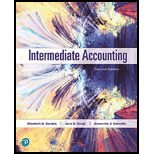
Intermediate Accounting (2nd Edition)
2nd Edition
ISBN: 9780134730370
Author: Elizabeth A. Gordon, Jana S. Raedy, Alexander J. Sannella
Publisher: PEARSON
expand_more
expand_more
format_list_bulleted
Question
Chapter 3, Problem 3.7BE
To determine
To identify: The three levels of the literature hierarchy for IFRS in the correct order, from 1 through 4.
Expert Solution & Answer
Want to see the full answer?
Check out a sample textbook solution
Students have asked these similar questions
Assume that markup is based on cost. Find the dollarmarkup and percent markup on cost for the following. 1. Cost: $24.65 2. Selling Price: $28.70.
Please provide the answer to this general accounting question using the right approach.
A business purchases depreciable equipment for 191 and sells it a few years later for 166. At the time of the sale, accumulated depreciation totals 106. If the company's tax rate is 39, what is the total after-tax cash flow that will result from selling this asset?
Chapter 3 Solutions
Intermediate Accounting (2nd Edition)
Ch. 3 - Prob. 3.1QCh. 3 - Prob. 3.2QCh. 3 - Does U.S. GAAP require that companies disclose...Ch. 3 - Does IFRS require that companies disclose...Ch. 3 - Prob. 3.5QCh. 3 - Does IFRS require that companies disclose their...Ch. 3 - Prob. 3.7QCh. 3 - Prob. 3.8QCh. 3 - Prob. 3.9QCh. 3 - Prob. 3.10Q
Ch. 3 - Prob. 3.11QCh. 3 - What is the Basis for Conclusions and where can...Ch. 3 - Prob. 3.13QCh. 3 - Prob. 3.14QCh. 3 - Prob. 3.1BECh. 3 - Judgment in Accounting for Plant and Equipment....Ch. 3 - Match Each Cognitive Bias Below with its...Ch. 3 - Prob. 3.4BECh. 3 - Prob. 3.5BECh. 3 - Prob. 3.6BECh. 3 - Prob. 3.7BECh. 3 - Codification Research. Referencing Appendix A,...Ch. 3 - Prob. 3.9BECh. 3 - Prob. 3.10BECh. 3 - Exercises E3-1. Accounting Policy Disclosures. To...Ch. 3 - Cognitive Bias. A team of accounting students is...Ch. 3 - Cognitive Bias. A team of accounting students is...Ch. 3 - Authoritative Literature. Provide the reference to...Ch. 3 - Authoritative Literature. Provide the reference to...Ch. 3 - Authoritative Literature. To what entity types...Ch. 3 - Authoritative Literature. How does FASB define...Ch. 3 - Prob. 3.8ECh. 3 - Prob. 1JCCh. 3 - Prob. 2JCCh. 3 - Prob. 1SSCCh. 3 - Surfing the Standards Case 2: Inventory...Ch. 3 - Basis for Conclusions Case 1: Judgment and...Ch. 3 - Basis for Conclusions Case 2: Income Statement or...
Knowledge Booster
Similar questions
arrow_back_ios
SEE MORE QUESTIONS
arrow_forward_ios
Recommended textbooks for you
 Auditing: A Risk Based-Approach (MindTap Course L...AccountingISBN:9781337619455Author:Karla M Johnstone, Audrey A. Gramling, Larry E. RittenbergPublisher:Cengage Learning
Auditing: A Risk Based-Approach (MindTap Course L...AccountingISBN:9781337619455Author:Karla M Johnstone, Audrey A. Gramling, Larry E. RittenbergPublisher:Cengage Learning Cornerstones of Financial AccountingAccountingISBN:9781337690881Author:Jay Rich, Jeff JonesPublisher:Cengage Learning
Cornerstones of Financial AccountingAccountingISBN:9781337690881Author:Jay Rich, Jeff JonesPublisher:Cengage Learning Auditing: A Risk Based-Approach to Conducting a Q...AccountingISBN:9781305080577Author:Karla M Johnstone, Audrey A. Gramling, Larry E. RittenbergPublisher:South-Western College Pub
Auditing: A Risk Based-Approach to Conducting a Q...AccountingISBN:9781305080577Author:Karla M Johnstone, Audrey A. Gramling, Larry E. RittenbergPublisher:South-Western College Pub Intermediate Accounting: Reporting And AnalysisAccountingISBN:9781337788281Author:James M. Wahlen, Jefferson P. Jones, Donald PagachPublisher:Cengage Learning
Intermediate Accounting: Reporting And AnalysisAccountingISBN:9781337788281Author:James M. Wahlen, Jefferson P. Jones, Donald PagachPublisher:Cengage Learning

Auditing: A Risk Based-Approach (MindTap Course L...
Accounting
ISBN:9781337619455
Author:Karla M Johnstone, Audrey A. Gramling, Larry E. Rittenberg
Publisher:Cengage Learning

Cornerstones of Financial Accounting
Accounting
ISBN:9781337690881
Author:Jay Rich, Jeff Jones
Publisher:Cengage Learning

Auditing: A Risk Based-Approach to Conducting a Q...
Accounting
ISBN:9781305080577
Author:Karla M Johnstone, Audrey A. Gramling, Larry E. Rittenberg
Publisher:South-Western College Pub

Intermediate Accounting: Reporting And Analysis
Accounting
ISBN:9781337788281
Author:James M. Wahlen, Jefferson P. Jones, Donald Pagach
Publisher:Cengage Learning